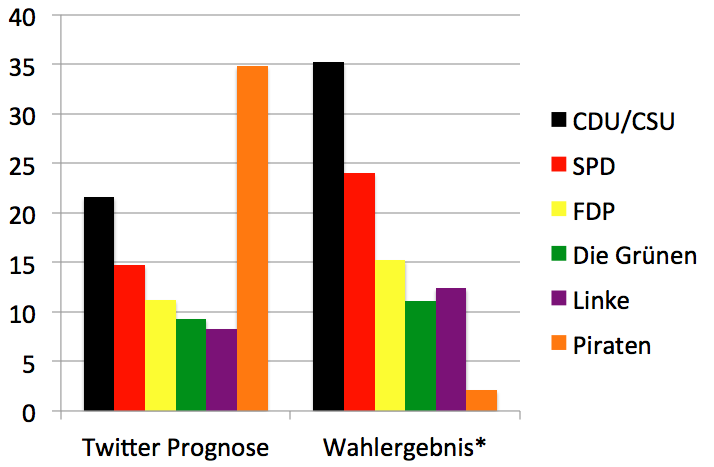With Pascal Jürgens [@pascal], and Harald Schoen I wrote a short blogpost for “Politik nach Zahlen“, a blog focused on empirical research on elections, hosted by the German newspaper Die Zeit. In “Twitterprognosen, oder: Warum die Piratenpartei beinahe die Wahl 2009 gewonnen hätte” we addressed the claim made by Andranik Tumasjan, Timm O. Sprenger, Philipp G. Sander, and Isabell M. Welpe in their paper “Predicting Elections with Twitter: What 140 Characters Reveal about Political Sentiment” presented at the AAAI Conference on Weblogs and Social Media, that Twitter would serve as a valuable instrument in forecasting election results. In their paper they found that the mentions of political parties on Twitter during a given time interval would closely mirror the election result. As the embedded diagram shows our results were not so encouraging.

More on that here.

Darren Lilleker
I have a theory, only a theory, but here goes. What Twitter can indicate is who or what the most engaged are talking about. it is perhaps a measure of awareness and interest and so can be used to measure campaigning effectiveness. However, because a lot of individuals are talking about a party this does not mean support per se. What it may act as is a cue to others to investigate more about the party, rather than making a simple decision it becomes more rational. I think this is the case with both the Liberal Democrats in the UK and the Piraten partie. Both gained a lot of interest and coverage but actually this highlighted their weaknesses and so led to them losing.
My theory simply, Twitter tells you where the spotlight is shining but not whether people like what they see.
Comments welcome!
Andreas Jungherr
@Darren Thank you for your comment. I guess the real question is for what social phenomena or processes we can take data from Twitter as an indicator. The natural first step is the analysis of communication behavior among users themselves. It might be interesting to compare communication activities around political topics with communication activities around lifestyle or commercial topics. While this might give us some deeper understanding of communication on the web these analyses don’t give us to much information on political campaigns.
While the impact of political campaigns is difficult to judge in the best of times I see at least some promises in the data made accessible through Twitter. On the one hand Twitter messages might serve as “event data” that helps the researcher to chronicle the process of a campaign. Here unexpected spikes in Twitter messages on political topics might serve as indicators of events during the campaign that held special interest, at least for Twitter users. Pascal and I did some preliminary work on this in the papers:
‘Wahlkampf vom Sofa aus: Twitter im Bundestagswahlkampf 2009’, in: Eva Johanna Schweitzer and Steffen Albrecht (eds.), Das Internet im Wahlkampf: Analysen zur Bundestagswahl 2009, (forthcoming).
and
‘Social Media Feeds as Sensor Feeds for Social Extreme Events: Political Twittering in Reaction to the Resignation of the Hessian prime minister Roland Koch’. Paper presented at EXTREMES 2010: International Workshop in Recent Achievements on the Study of Extreme Events (VW-Workshop), Potsdam, Germany on 27-29 September.
Another possibility would be the detailed analysis of high profile campaign events, like leader’s debates, and their Twitter shadow. An analysis like this could be modeled for example on
Conversational Shadows: Describing Live Media Events Using Short Messages by David A. Shamma, Lyndon Kennedy, and Elizabeth F. Churchill;
Characterizing Debate Performance via Aggregated Twitter Sentiment by Nicholas A. Diakopoulos, and David A. Shamma;
or:
Tweetgeist: Can the Twitter Timeline Reveal the Structure of Broadcast Events? by David A. Shamma, Lyndon Kennedy, and Elizabeth F. Churchill.
We haven’t looked at our data in this way, but in these approaches lie, at least in my view, significant potentials for researchers interested in specific campaign specific questions. Admittedly these approaches do not predict but try to understand and maybe explain specific aspects of political campaigns, but who says social scientists have to be haruspices?
Alexandra Ripken
Thanks for your article I liked to read.
I referre to it on my latest blogpost on “Woran erkennst Du Freunde?”.
I quote you and your results to underline the alertness we must show in taking twitter shadow or facebook fan numbers as a feedback for our relevance in real life.